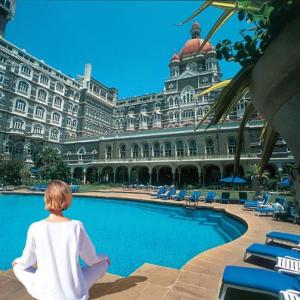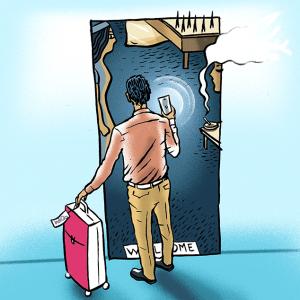'The toughest challenge is not to satisfy the luxury customer.'
'The toughest challenge is to satisfy the budget customer.'
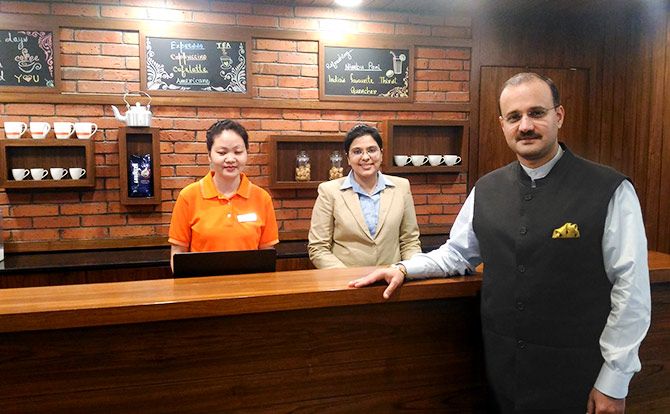
The 41st Ginger hotel is about to open its doors in Teli Galli, Andheri East, northwest Mumbai, about ten minutes from the city's international airport.
The hotel awaits the last few permissions from the government before it can start checking guests in at its Coffee and Keys front desk.
Meanwhile, a variety of test runs are happening on its premises. And meticulous prepping.
General Manager Arif Asmath has been going around making a long list of things to be remedied.
Whether it is the angle of the signage on floor 2. Or spots where the wall is getting unnecessarily scuffed.
Multiple rounds of training are happening all over the place.
In the kitchen.
Behind the cash register.
At the X-ray machine outside the main doors.
In the lobby.
This Ginger, with 142 rooms, feels much more upmarket than many of its older sisters and brothers.
Shiny and sleek. Rooms, with wood tile floors, are elegant if spartan. Views of the less hectic Teli Gali outside are pleasant.
But it sits nearly at the same price point (somewhere between budget and midscale) as other Gingers, offering double rooms for Rs 5,555 per night.
Uniquely -- and in sync with the group's special focus of attracting many more of the growing population of single women travellers -- it has a special ladies floor where all rooms are only given to women guests.
And that floor's elevator is sealed off from other floors and guests.
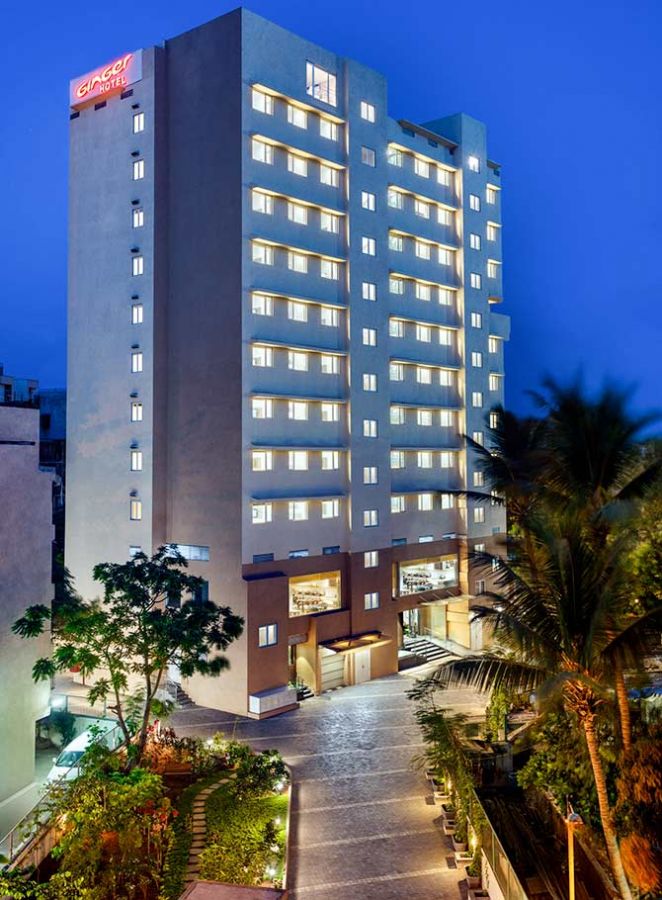
Some of Ginger's senior management -- Rahul Pandit, the MD and CEO, and Nikhil Sharma, chief operating officer -- are sitting in a conference room off the main lobby, in earshot of some eleventh hour drilling.
It is the war room. F&B keeps sweeping in and out with trays of beverages and tidbits for the big guns to sample. All manner of important consultations are happening too. Cell phones trill non stop.
It has taken three-and-a-half years to get this hotel, which has several environment-friendly features, going.
Although India's license raj is a dinosaur of the past, it still requires an extraordinarily long time to get permissions to build or run a new hotel.
The Ginger chain, which began in 2004, will within months be up to nearly 50 hotels when several more open in Ahmedabad, Aurangabad, Surat, the Jim Corbett National Park, Gurgaon, and Lucknow.
It has been a unusual journey for the group as it works to frugally upgrade its offering, while constantly unraveling the requirements of the tricky Indian budget customer, who wants everything, be it bandwidth or bed width, at the lowest price, of course.
Little things, explains Pandit, work magic.
Like instead of dispensers, providing bars of orange-fragrance glycerine soap -- Indians seem to like their soap cakes.
Or extending the complimentary breakfast hours at Gingers located at both business and leisure destinations to 11 am and 12 pm respectively.
"One of the GMs told me 'I don't want to do this... I had family who had breakfast at 7 am, then they went to the beach and at noon again had breakfast. Look I am going to lose my lunch scene.' I said, 'but look at the positives. That guy is going to come back to you!'" says Pandit
The chain is now seeing an uptick in foreign tourist check-ins at some Ginger locations like Bhubaneshwar, Manesar, Agartala, Guwahati and Noida. It expects the Mumbai Ginger will see many overseas tourists footfalls.
In an interview to Rediff.com's Vaihayasi Pande Daniel, Pandit and Sharma shed light on what works in the budget and mid-scale hotel sector.
They also provide key insights into the behaviour of the Average Indian Hotel Guest.
Pandit and Sharma also explain why the Indian hotel industry is not growing as fast as it could.
India's Socialist past has lead to hotels being considered a luxury item and not part of infrastructure or of national economic importance.
But tourism, says Pandit, is a soft power and hotels promote tourism, they can be environmentally friendly and offer safe, secure employment in many rural areas.
How does India fare compared to hotel room numbers worldwide? Do we have enough rooms?
If you see our sector globally: It is a regular pyramid of supply.
All over the world today, there are 20 million plus hotel rooms. The world population is 7 billion.
So the ratio works out to about 28 rooms per 10,000 people.
The most mature (hotel) market is the US, who has over one-fourth of the global supply. 5 million rooms sit there.
The US has a population of 300 million, so the US has 180 rooms per 10,000 people.
... In India the big thing is our supply -- only one room to 10,000.
So if you were a global CEO, sitting somewhere, you would say, 'Hey, big land of opportunity coming here.' But then you have to see what was happening...
Globally, for one luxury hotel room, there are three upscale rooms, five mid-scale and seven budget.
Like any other industry, at the luxe price point, you have the least.
When you come down, you have the max.
In India it is an inverted pyramid. Of the tracked supply that we have, more than 65 per cent sits in luxury or upscale rooms.
So it is like you board a 200-seater aircraft and when you go in you say: 'Hey, 130 seats are first or business.'
Then you say it is a very odd configuration in the aircraft. In India it is like that.
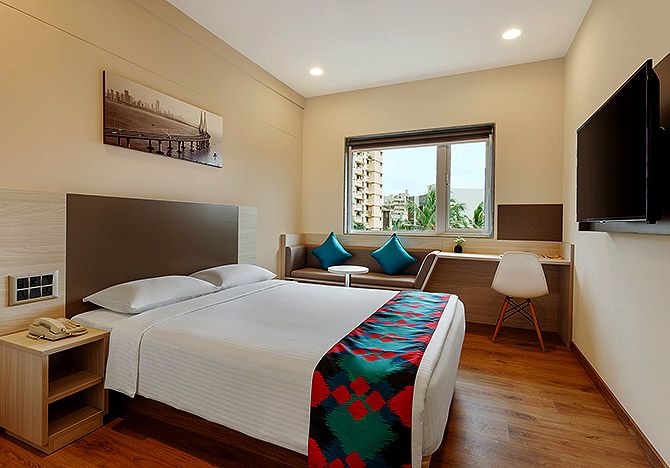
Why does India have an inverted pyramid of hotel room numbers?
For two reasons. Real estate in India is not zoned by end-use.
In mature economies, when a government plans a city or a development, (it says) this plot of land is residential, this is commercial, this is warehousing, this is hospital, this is retail and so forth.
Two things happen as a result of that. First of all, the government is able to plan civic amenities.
And infrastructure -- how much transport do you need, how much road. Land use -- is planned.
Second, when you know that on this plot of land I can only do a hotel or a hospital or school or whatever, your returns are capped by that end use.
In India, there is no classification like that.
We have just essentially three (classifications) -- industrial, residential and commercial.
Within that, it is open to each state government to change land use.
Two things happen as a result of that.
First of all, land becomes a tradable commodity, because you can flip its use.
The second, planning for civic amenities, is very odd.
Take as an example, Bombay. How do you plan in a place like that?
As a result of land being a commodity, the embedded cost of land in a hotel project in India could be as a high as 50 to 60 per cent.
Globally, land cost typically is between 15 and 20 per cent.
In China it could be (as low as) 0 to 10 to a top end (amount) of 15.
For people who are doing hotel development in India, if the embedded cost of land is very high, then many think it is more risk averse to go upmarket...
They would say if 60 percent of my capex is anyway fixed, then for a little more incremental increase at the top of the up cycle, I would be able to (earn) better.
The second thing is the RoE (return of equity).
For the hotel sector in India, the RoE is typically Return of Ego.
The word 'hotel' is very synonymous with luxury.
The market is not so mature to understand differentiation...
Being a hotel owner is a matter of ego or pride.
So many people have a very irrational frame of returns.
You are not competing for returns. A large part of the hotel supply in India has been created by independents.
It is also conversion of cash into an asset. If the cash was left at home, it may get raided or it may depreciate.
The moment it is in an asset -- even if the business returns are zero -- your asset is still appreciating.
The third thing is, even though we call our hotel sector an industry, if you go by the RBI, it is still not considered an infrastructure item.
So hotels don't get infrastructure lending, even for budget and mid-market hotels.
Hotels in India get debt in double digits for very short repayment tenures (5 to 7 years).
In mature economies, hotels get access to debt in single digits and the tenure could be 20 to 25 years.
Since the business needs so much capital injection and you do capex recovery only after a full cycle (of seven years), it is a business of long gestation.
All of these factors lead to that (inverted pyramid).
Graphic: Rajesh Karkera/Rediff.com and Ashish Narsale/Rediff.com
What are the unique issues that arise while dealing with the Indian customer?
What do customers think of hotels? They think it is an item of luxury.
Next of the prevailing supply (available), the majority of it is upscale and luxury.
Globally, when you travel down these price points, what is changing essentially is not the product.
What is changing is the ambit of services.
At luxury you get everything 24x7.
When you come to budget you are effectively getting coffee and doughnuts in the lobby.
But in India, our arbitrage is not on labour. Our labour costs are low.
Our arbitrage is capital. So if you go to a dhaba also, the guy will come and serve you a cup of tea in your car.
The big difference between Indian consumers versus other consumers in more mature markets, Indian consumers expect service at all price points. They are used to it.
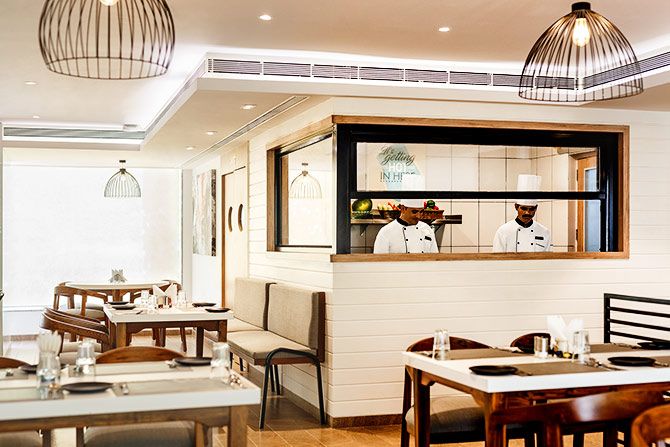
Many of the consumers, people who then trade down from here, they are more appreciative of value.
(They understand that) you are getting a low price and you are (still) getting a larger ambit of services.
But the toughest challenge is not to satisfy the luxury customer.
The toughest challenge is to satisfy the budget customer.
This guy may be moving from the unbranded or unstructured market, where everything was available.
That establishment (where he used to stay) may not have been obeying local fire safety norms.
It may not have been built on approved land. So on and so forth.
But the guy was getting everything.
Even though the basics of the business -- which is hygiene and security -- may have been missing.
When they come to the structured market, which has all these constraints, the consumer becomes very, very finicky.
Because if (say) they were staying in guest houses, the guy was serving you 24 hours, he is used to everything (even if he didn't know where it was being made and how it was being made).
When he comes here -- to a hotel in the structured market, which may be built on land which is for that purpose, obeying all government and fire safety norms -- his expectation typically is 'Hey everything is available to me. Everyone is at my beck and call.'
The other issue that comes in here is, because the word hotel in India is synonymous with luxury, the image it conjures is that: 'When I am landing at a hotel it is a luxury experience.'
The expectation is that when I drive my car in, there would be a valet.
There would be someone saluting me.
There would be someone carrying my luggage and all of that.
Now you see the global brands.
When they have come into India they have had to adopt.
If you look at say a Fairfield or a Marriott or an Ibis, all of these guys globally would not have in-room dining, would not have luggage delivery.
The Ibis at Delhi airport, interestingly, has a heated swimming pool!
It is the first of its kind in the world (at that price point). Nowhere would they have stuff like that.
The Indian consumer demands so much service.
Given that Indians are often poor users of facilities, what happens to hotel maintenance costs?
You must have to spend hugely in that area.
Yes and no.
We spend a lot on maintenance.
One reason is because we deliver occupancy rates which are typically 20 per cent higher than the market.
We get more heads on beds. So there is more utilisation of the rooms.
We make our rooms such that in five to seven years we can effectively replace the room, unlike a luxury product.
So were going with the intent to sell them maximum seven years. Anyway then, we redo the room.
The cost of maintenance for those seven years -- we have to be at it -- is high so that it is right.
For example, if it is plumbing fittings or if it is the furniture in the room, we don't use teak, which you would find in luxury rooms.
In that sense, if you were to look at opex (operating expenses) over a full cycle -- let's say a seven year period -- and include the cost of replacement, then it may be higher, but it is as per design.
Don't miss the next part of this interview!








